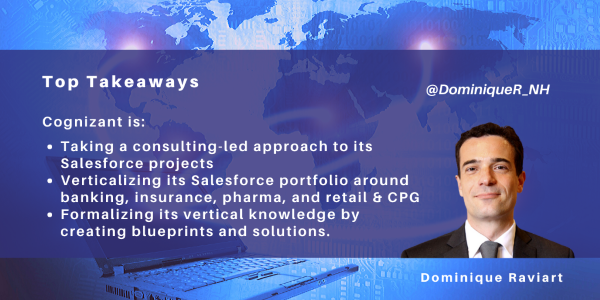Search posts by keywords:
Filter posts by author:
Related NEAT Reports
Other blog posts
posted on Oct 30, 2019 by Dominique Raviart

We recently talked with Cognizant’s Salesforce Consulting & Solutions Group (CSG) unit, recently set up in Europe. The unit reflects ongoing investment by Cognizant in its Salesforce capabilities, with a more vertical focus, accommodating Salesforce’s growing product portfolio.
CSG complements the capabilities of Cognizant Interactive and Cognizant Consulting by bringing vertical knowledge and consulting capabilities relevant to Salesforce. CSG has been in hiring mode, recruiting business consultants with experience in banking, insurance, pharma, retail and CPG.
Pushing towards verticalized offerings
Along with this vertical recruitment, CSG is formalizing its vertical knowledge with the creation of Salesforce-related vertical-specific blueprints. The unit is systematically identifying areas within each vertical that are prime for digital disruption, e.g. in retail and CPG, processes that used to be customer high-touch (providing in-store cross-selling opportunities) and that are now occurring over the internet (aiming to help retailers to find new ways of maximizing cross-selling). In total, CSG now has around 25 blueprints that can help it rapidly engage in discussions with clients.
CSG is helping Cognizant’s Salesforce practice to further sharpen its vertical focus through the creation of solutions that cover functional gaps currently not covered by Salesforce’s Cloud products, building on four existing solutions in retail banking, wealth management, insurance and life science. One example is a solution for collections, aligning Service Cloud with different geo-based regulations. The creation of additional solutions is currently a work in progress.
CSG is expecting to provide these solutions as part of its service portfolio and is confident this investment will help it differentiate its offerings and align with clients’ expectations in bringing a vertical-ready capability. In due course, CSG will consider if it needs to turn several of the solutions into software products with license and maintenance subscriptions.
Making the most of current implementations
Along with its vertical and consulting push, CSG is also helping Cognizant’s Salesforce practice around aftermarket services. CSG recently launched its Good-to-Great assessment service. During a two-week engagement, Cognizant assesses how Salesforce Clouds have been implemented from a process, technical and functional point of view, looking to maximize usage of the client’s investment in Salesforce’s Clouds. Good-to-Great relies on the traditional approach of checklists, its outcome being a report deliverable that includes suggestions for improvement.
Matching Salesforce in its investments
The company continues to focus on Salesforce Sales (with CPQ), Service and Community Cloud, and B2B (CloudCraze) and is targeting two growth markets: Marketing Cloud and Commerce Cloud among its large corporate clients, focusing on a 360-degree customer view. Looking ahead, Cognizant wants to invest in its capabilities around Salesforce’s September 2019-launched CPG Cloud and Manufacturing Cloud.
Several acquisitions have helped Cognizant growth its Salesforce portfolio and footprint. In late 2018, the company acquired two Salesforce service partners: ATG, a U.S. vendor specialized in CPQ and quote-to-cash processes, and SaaSfocus, an Australian vendor of significant size (~350 personnel at the time of the purchase), with a significant footprint in India.
In parallel, Cognizant has also adapted the structure of its Salesforce practice to include its MuleSoft practice (Salesforce acquired MuleSoft in 2018), adding 1.7k consultants.
With Tableau Software now part of Salesforce, Cognizant will have to consider if it should merge the two practices or keep its Tableau capabilities separate. Like other vendors, Cognizant is likely to face more similar challenges: Salesforce has given guidance that it will be a $16.9bn firm by the end of FY20 (ending January 31, 2020) and it continues to have appetite for M&A, even after its recent $15.7bn Tableau acquisition. This signals that Cognizant will have to further adapt its capabilities in the year to come.
